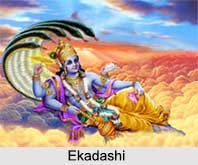 Ekadashi is the 11th day of a lunar calendar or Panchangam. The Hindus observe fasting on Ekadashi. It means the 11th day of each half of the month in the Vedic lunar calendar. So there are two Ekadashi days in each month on the Vedic calendar. One is in the first half of the month whilst the moon is waxing, or growing. This is known as the Bright Fortnight. The second is in the second half of the month whilst the moon is waning, or shrinking. This is known as the Dark Fortnight.
Ekadashi is the 11th day of a lunar calendar or Panchangam. The Hindus observe fasting on Ekadashi. It means the 11th day of each half of the month in the Vedic lunar calendar. So there are two Ekadashi days in each month on the Vedic calendar. One is in the first half of the month whilst the moon is waxing, or growing. This is known as the Bright Fortnight. The second is in the second half of the month whilst the moon is waning, or shrinking. This is known as the Dark Fortnight.
Etymology of Ekadashi
Ekadashi is a Sanskrit word for number 11. The word "Eka" means one and "Dashi" means ten, which means 11th day after a full moon day or a new moon day.
Fasting of Ekadashi
The fasting of Ekadashi varies greatly; some people do not eat anything at all, some eat a restricted diet, which consists of simple items like milk and fruits and they do not do any cooking, while some eat elaborately cooked meals that are prepared out of restricted and selected ingredients. But, all the people performing fasting have the same goal of attaining spiritual benefit.
Types of Ekadashi
There are different types of Ekadashi that falls throughout the year. These are as follows;
•Saphala Ekadashi observed during Pausha Krishna Paksha at December-January
•Putrada Ekadashi on Pausha Shukla Paksha in December-January
•Sat Tila Ekadashi on Magha Krishna Paksha in January-February
•Bhaimani Ekadashi on Magha Shukla Paksha in January-February
•Vaikuntha Ekadashi on Phalgun Krishna Paksha in February-March
•Amalaki Ekadashi on Phalgun Shukla Paksha in February-March
•Papamochani Ekadashi on Chaitra Krishna Paksha in March-April
•Kamada Ekadashi on Chaitra Shukla Paksha in March-April
•Varuthini Ekadashi on Vaisakh Krishna Paksha in April-May
•Mohini Ekadashi on Vaisakh Shukla Paksha in April-May
•Apara Ekadashi on Jyeshtha Krishna Paksha in May-June
•Pandava Ekadashi on Jyestha Shukla Paksha in May-June
•Yogini Ekadashi on Ashaad Krishna Paksha in June-July
•Shayani Ekadashi in Ashaad Shukla Paksha on June-July
•Kamika Ekadashi on Shravan Krishna Paksha in July-August
•Pavitropana Ekadashi on Shravan Shukla Paksha in July-August
•Ananda Ekadashi on Bhadrapada Krishna Paksha in August-September
•Parsva Ekadashi on Bhadrapada Shukla Paksha in August-September
•Indira Ekadashi on Ashwin Krishna Paksha in September-October
•Pasankusha Ekadashi on Ashwin Shukla Paksha in September-October
•Rama Ekadashi on Kartik Krishna Paksha in October-November
•Utthana Ekadashi on Kartik Shukla Paksha in October-November
•Utpanna Ekadashi on Margashirsha Krishna Paksha on November-December
•Mokshada Ekadashi on Margashirsha Shukla Paksha in November-December
•Padmini Ekadashi on Purushottam Shukla Paksha in June-July
•Parama Ekadashi on Purushottam Krishna Paksha in July-August
Significance of Ekadashi
Fasting on Ekadashi is a mandatory ritual. Different Ekadashi has different story behind it. Some sages suggest that a person should fast on any Ekadashi to free from sin. According to Hindu scriptures, Ekadashi and movement of the moon has a direct correlation with the human mind. It is believed that during Ekadashi, human mind attains maximum efficiency giving the brain a better capacity to concentrate. Devotees fast on this day, observe vigil the whole night by doing Puja and meditation. By fasting, a person becomes alert and attentive and devotion towards God becomes intense.




















